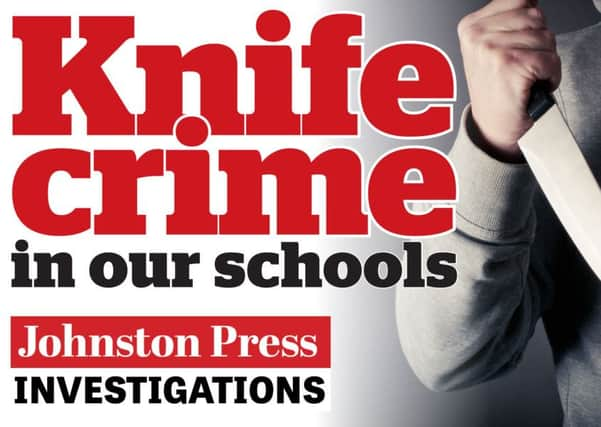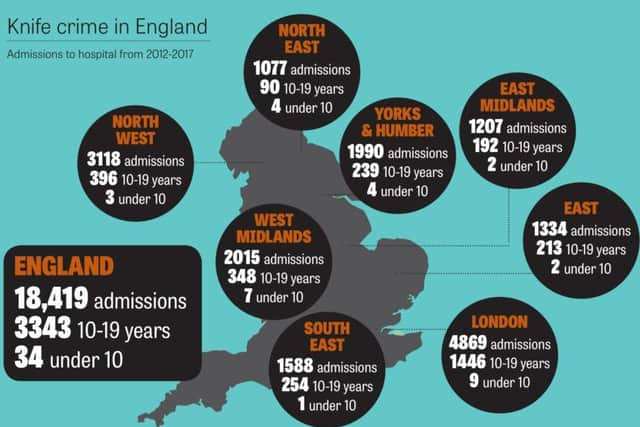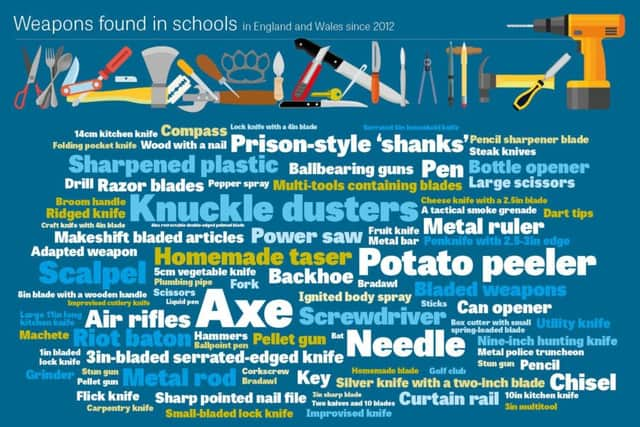Knife crime: ticking time bomb in GB schools


Teachers across England and Wales are facing a growing number of knife crimes in their classrooms and playgrounds, according to figures obtained exclusively by the Johnston Press Investigations Team from police forces and education authorities.
And the figures show a ticking time-bomb as on average, every day in Great Britain one child will be caught carrying a knife into school.
Advertisement
Hide AdAdvertisement
Hide AdBy contrast, the Education Authority of Northern Ireland said there was only one knife related incident in the Province last year.


But more than 2,400 pupils have been caught in English and Welsh schools with a knife, blade or other weapon since 2012, data obtained under Freedom of Information laws from more than half of UK police forces reveals.
And the crisis in Great Britain is growing. Our investigation shows a 42.2% rise in children caught in possession of a knife or blade or other weapon over the last two academic years.
But some areas of the UK, including rural counties, have seen increases of up to 200%. Reports of knife crimes in schools have increased overall by 12%.
Advertisement
Hide AdAdvertisement
Hide AdBetween 2012/13 and 2016/17, more than 18,000 people were admitted to hospital with injuries of this nature in English hospitals – over 3,300 of which were young people aged 19 and under, almost one in five cases.


In South Yorkshire, there has been a 151 per cent rise in the number of children caught knives in school over the last two full academic years. In Greater Manchester, possession of weapons has increased by more than 90 percent. The West Midlands has seen an increase of nearly 30 per cent and London more than 20 percent.
The overall increase in possessions could be even higher - nearly a dozen forces refused or partly refused to provide data saying it would exceed cost limits.


Advertisement
Hide AdAdvertisement
Hide AdToday, teachers, campaigners and senior politicians are calling for tougher action and better monitoring of knife-crime before more lives are lost.
A Government minister who sits on an inter-ministerial body charged with tackling knife crime has admitted the figures were “frightening”, as another senior MP warned a generation of children were growing up “desensitised” to knife violence.
Robert Buckland QC, Solicitor General for England and Wales, said: “These are frightening statistics. The message still has to get through to young people that carrying a knife for your own protection is probably the most dangerous thing you can do.”
Sarah Jones, chair of the All Party Parliamentary Group on Knife Crime and MP for Croydon Central, has called for a 10-year strategy to tackle violent crime and has warned that cuts to youth services are also pilling extra pressure on schools.


Advertisement
Hide AdAdvertisement
Hide Ad“My fear is that generation of young people are growing up desensitised to violence,” she said.
The investigation follows a series of high-profile knife attacks in schools including the deaths of teacher Ann Maguire at a college in Leeds in 2014 and Bailey Gwynne, 16, at a school in Aberdeen in 2015.
Just last week, when the annual Crime Survey for England and Wales showed a shocking 21 per cent increase in all knife crimes nationally, a 14-year-old boy was left permanently disfigured in an alleged attack with bladed weapon outside a Glasgow secondary school. A school in Lancashire also went into lockdown amid fears youths armed with knives were making their way to the campus.
When Johnston Press asked the Government if parents would be rightly alarmed at the finding that somewhere in the UK every day, a child carries a knife into school, both the Home Office and the Department for Education declined to comment.
Advertisement
Hide AdAdvertisement
Hide AdIn a statement, the Government said it launched a new community fund in October for projects to tackle knife crime and has since awarded £765,000 to 47 successful bids in England and Wales.
It said ministers have also launched a consultation on new legislation on offensive and dangerous weapons, including introducing an offence of having an article with a blade or point, or offensive weapon, in educational institutions other than schools.
A spokesman for the Department for Education: “This government has taken decisive action to put teachers back in charge of discipline in the classroom by strengthening their powers to take action if they suspect a pupil has brought prohibited items, including knives, into school.
“It is of paramount importance that schools provide a safe environment for their pupils, and any incident that does occur is completely unacceptable.
Advertisement
Hide AdAdvertisement
Hide Ad“Knife crime has devastating consequences and this Government is determined to tackle this and do all it can to break the deadly cycle and protect our children, families and communities.”
But Patrick Green, trust manager at the anti-knife crime charity The Ben Kinsella Trust, said: “These figures are frightening and what is of of greater concern is they don’t show the full extent of the problem.”
Schools in Scotland have also been inundating knife crime prevention workers with requests for help after the tragic stabbing of a schoolboy, with campaigners hailing the country as a beacon for the rest of the UK to follow.
Headteachers who feared earning a bad reputation for their school have now opened up to asking for support after the tragic killing of Aberdeen teenager Bailey Gwynne.
Advertisement
Hide AdAdvertisement
Hide AdBailey,16, was attacked at Cults Academy, one of Scotland’s highest performing state schools, in October 2015. He was taken to hospital but died at Aberdeen Royal Infirmary.
Jane Dailly, senior development officer at campaign group No Knives, Better Lives, said the shocking killing had led to a dramatic change in schools’ views. A major report found his death in 2015 could have been “potentially avoidable” if other pupils had told teachers the killer was carrying a knife.
Ms Dailly said: “We’ve seen a sharp increase in practitioners requesting support. That’s really off the back of the Bailey Gwynne report. Schools are wanting to do everything that they possibly can.”
Data obtained from Police Scotland by Johnston Press Investigations shows 80 youngsters were found to have knives on school premises, and 19 others used them in “other criminal activity” between April and December last year.
Advertisement
Hide AdAdvertisement
Hide AdThere were also 25 cases of possession of an offensive weapon in a school and possession of an offensive weapon in a school which was used in other criminal activity.
Our figures were obtained after the Scottish Crime Recording Board changed the way knife crime in schools was recorded in April 2017, following a request from Police Scotland, to create a new recording standard for knife crime.
It included the introduction of several crime codes for possessing either an offensive weapon or an article with a blade or point in schools.
Backed by the Scottish Government, the £3.4m No Knives, Better Lives project has been tackling knife crime since 2009 by training hundreds of school teachers and youth workers.
Advertisement
Hide AdAdvertisement
Hide AdThe campaign provides advice and support including online training and educational toolkits for schools, along with a network of “peer educators”.
A play presented to 60 schools last year in Scotland, Balisong, led a pupil in Ayrshire to immediately tell a teacher about another student who had a knife, she said.
Patrick Green, manager at anti-knife crime charity The Ben Kinsella Trust, said the rest of the UK has much to learn from Scotland.
He said: “We should take some learning from what has been done in Scotland where there has been some progress working with children from age six and upwards. It shows that with the right intervention and resources, you can bring bring knife crime down.”
Advertisement
Hide AdAdvertisement
Hide AdScottish Government officials say they are determined to tackle knife crime in schools.
Since 2008, it has invested more than £8.7m into the Scottish Violence Reduction Unit - a national centre for expertise on violence. It also consulted with teachers, parents and medics and found no support for teachers to be given new search powers.
A spokeswoman said: “It is important that these figures are seen in the overall context of a 64 per cent reduction in crimes of handling offensive weapons in the last decade.
“We are determined to continue making progress – and the decision to specifically record offences of possession of weapons in schools was precisely in order to support efforts to make Scotland’s schools safer. We continue to work with schools and local authorities on anti-violence campaigns and curriculum programmes on a range of initiatives.”